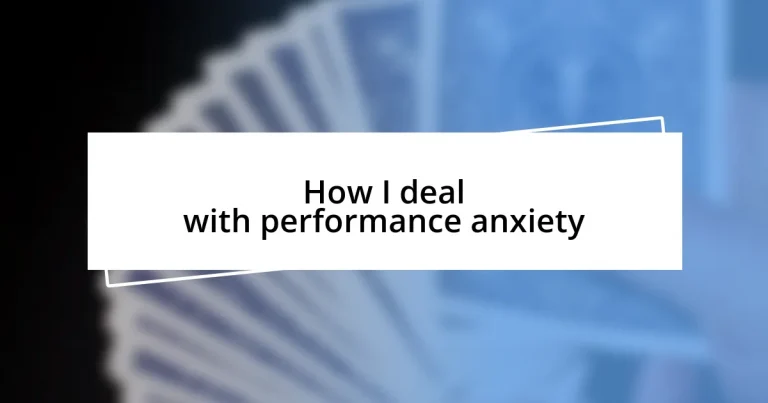Key takeaways:
- Understanding performance anxiety involves recognizing triggers and embracing vulnerability to transform fear into a manageable experience.
- Techniques such as deep breathing, visualization, and preparing adequately can significantly reduce anxiety levels before high-pressure situations.
- Seeking professional help and participating in group therapy can provide valuable support and strategies for overcoming performance anxiety.
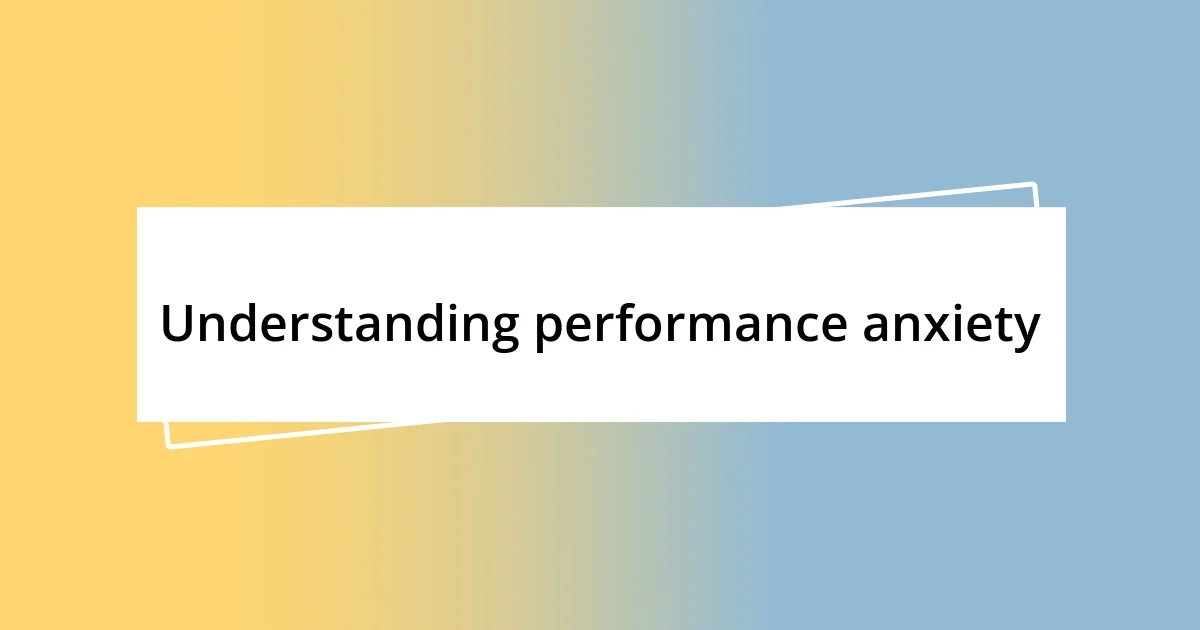
Understanding performance anxiety
Performance anxiety is a common experience, often triggered by the pressure to meet expectations, whether they’re our own or those of others. I remember standing in front of an audience once, my heart racing, palms sweaty, realizing I was so focused on their judgment that I completely lost sight of what I wanted to say. Have you ever felt that disconnect between your intentions and your actual performance?
It’s fascinating how our minds can create these narratives that amplify our fears, leading to a cycle of self-doubt. I often ask myself, “What if I stumble?” rather than focusing on the joy of sharing my knowledge. This line of questioning can intensify anxiety, making it hard to even start. It’s crucial to recognize these thought patterns; they’re often fueled by perfectionism and an overwhelming desire to please.
Digging deeper, I find that performance anxiety isn’t just about fear—it’s intertwined with vulnerability. The moment I embrace that vulnerability, acknowledging it as part of my human experience, I feel a sense of relief. Isn’t it liberating to realize that we’re not alone in these struggles? Understanding that performance anxiety affects many helps to normalize the experience, turning it from a paralyzing weight into something we can collectively navigate.
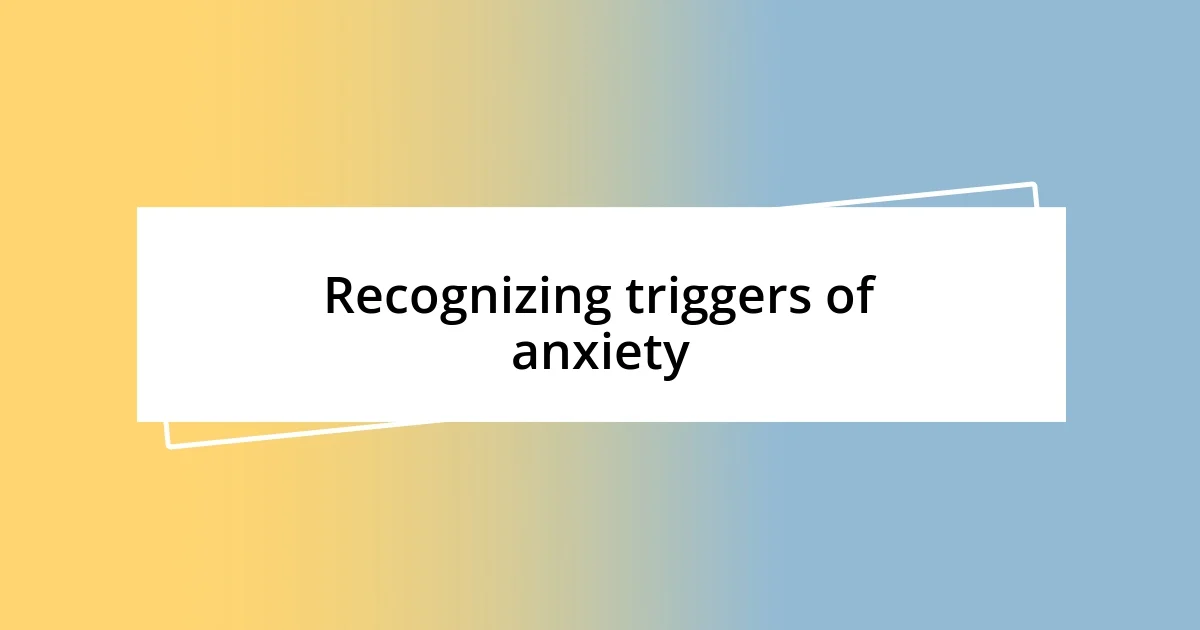
Recognizing triggers of anxiety
I’ve noticed that my triggers often come from specific situations, like delivering a presentation or even just speaking up in a meeting. The moments leading up to these events can be filled with a mix of excitement and dread. For instance, I once found myself freezing before sharing my ideas, feeling an overwhelming urge for the spotlight yet fearing what might follow. Have you ever experienced a similar conflict?
Sometimes, external factors play a huge role in raising my anxiety levels. For example, certain environments—like a room full of unfamiliar faces—can really heighten those feelings. I remember attending a networking event where the noise felt deafening, and I could sense the pressure to make a good first impression. It’s in those moments that my heart pounds the hardest. Isn’t it intriguing how our surroundings can affect our mental state?
While I’m aware of these triggers, I’m still working on uncovering the nuances of anxiety in different scenarios. Notably, I’ve discovered that stress can also stem from my own high expectations, often leading me to overprepare. This realization has been pivotal; by recognizing these patterns, I can start to approach situations with a calmer mindset. How do you navigate your own triggers?
| Trigger | Personal Experience |
|---|---|
| Presentations | Heart racing, freezing up, feeling torn between excitement and fear. |
| Networking Events | Overwhelming environment heightens anxiety, leading to hesitation in approaching others. |
| Self-expectations | Overpreparing due to perfectionism, realizing later that it increases stress. |
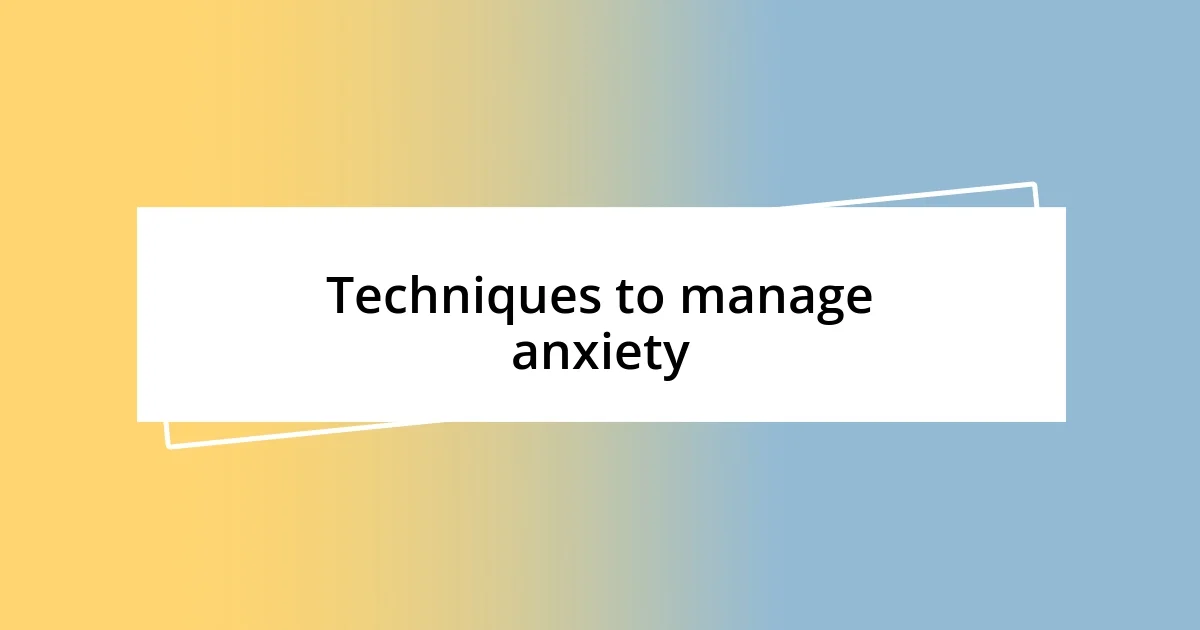
Techniques to manage anxiety
There are several techniques I’ve found helpful in managing performance anxiety. One approach that resonates with me is deep breathing. When I feel that familiar knot in my stomach, taking a moment to focus on my breath can be a game changer. I close my eyes, inhale deeply through my nose, hold for a few seconds, and exhale slowly through my mouth. This simple act not only calms my nerves but also brings me back to the present moment, allowing me to reconnect with my purpose.
To further empower myself, I also practice visualization. Imagining a successful performance plays a crucial role in my mental preparation. Here are some techniques I’ve incorporated into my routine:
- Deep Breathing: Slow, measured breaths to alleviate tension.
- Visualization: Picture a successful outcome to reduce fear.
- Positive Affirmations: I remind myself of my strengths to shift my mindset.
- Mindfulness Exercise: Engage in simple mindfulness practices to stay grounded.
- Preparation and Planning: Feeling well-prepared can drastically reduce my anxiety levels.
These techniques have helped turn anxiety into a manageable experience, allowing me to focus on what truly matters.
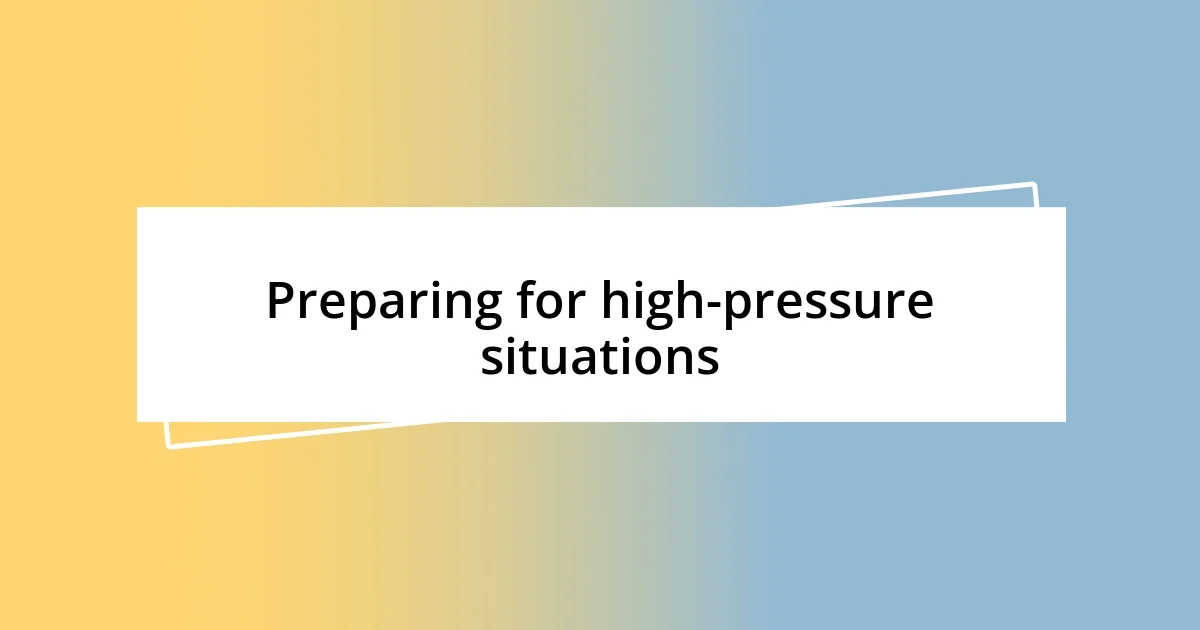
Preparing for high-pressure situations
Preparing adequately for high-pressure situations has been crucial for me. One time before giving a significant presentation, I created an extensive outline and even rehearsed in front of a friend. That preparation not only boosted my confidence but also calmed those nagging butterflies in my stomach. Have you ever noticed how being well-prepared allows you to focus less on the outcome and more on the message you want to share?
I also find it incredibly helpful to visualize the entire event beforehand. Before a big meeting, I close my eyes and picture myself navigating through the discussion smoothly, responding with clarity and confidence. It’s remarkable how envisioning success can reshape my mindset—like a warm blanket easing my nerves. Have you tried this technique before? It can truly make a difference.
Additionally, I jot down potential questions or scenarios that may arise, which prepares me for the unexpected. I recall a time when, facing a tricky client query, I felt ready because I had already anticipated and rehearsed the answers. That preparation turned a potentially daunting moment into an opportunity for connection instead. Isn’t it fascinating how taking these simple steps can convert anxiety into preparedness?
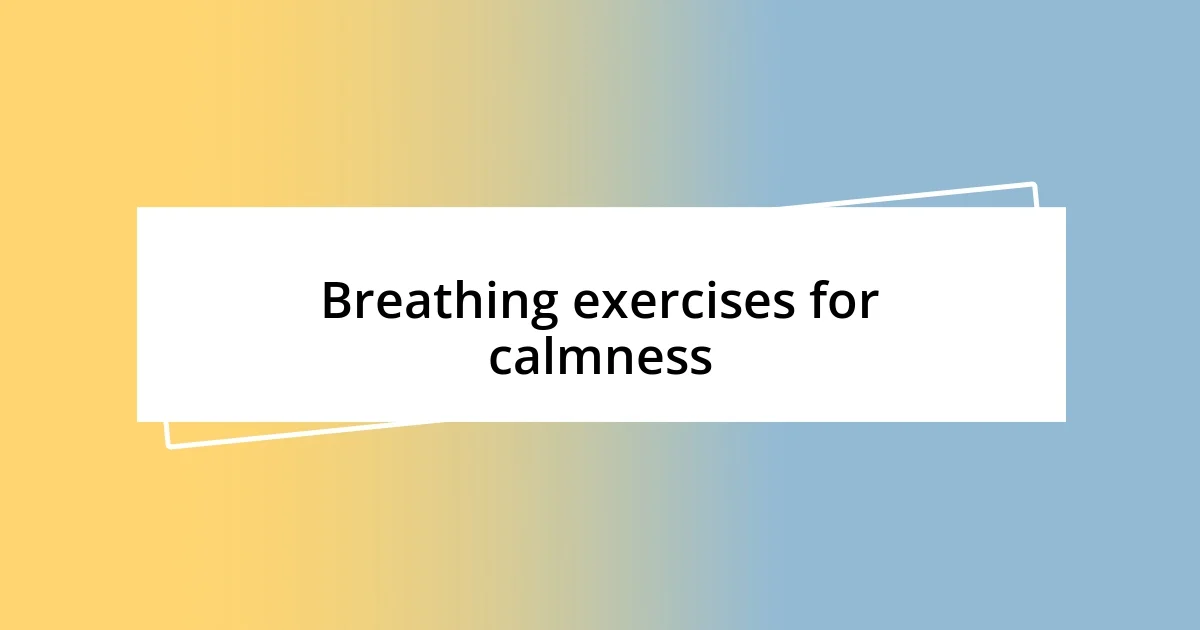
Breathing exercises for calmness
Breathing exercises are truly a lifeline for me when anxiety starts to creep in. One technique I lean on is the 4-7-8 breathing method, which I stumbled upon during a particularly stressful week. I inhale through my nose for a count of four, hold my breath for seven seconds, and exhale through my mouth for eight counts. It might sound simple, but I often find that this rhythm creates a bubble of calm, allowing me to reset my mind and ground myself.
I remember one performance where my heart raced in anticipation. I stepped backstage and practiced box breathing, a technique where I inhale, hold, exhale, and hold again, all for equal counts. By the time I stepped out, I felt an incredible sense of control. Isn’t it fascinating how these small moments can transform overwhelming situations into manageable ones? This exercise not only calms my nerves but also sharpens my focus, enabling me to truly connect with the audience rather than my anxiety.
Another favorite of mine is diaphragmatic breathing, which involves breathing deeply from the diaphragm rather than shallowly from the chest. One day, during a stressful work presentation, I consciously engaged my diaphragm and noticed a noticeable shift in how I felt. I’ve found that this method reduces tension and helps me project my voice more confidently. When was the last time you took a moment to breathe deeply? I encourage you to try it; you might just discover the clarity and calmness waiting on the other side.
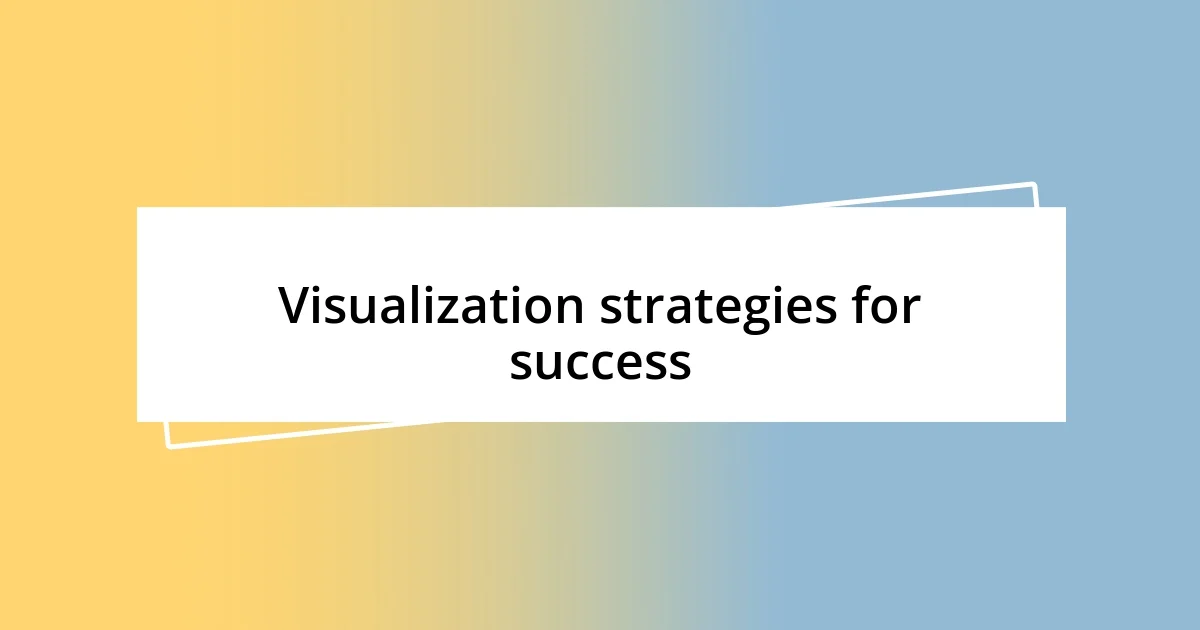
Visualization strategies for success
Imagining success isn’t just a pleasant thought; I’ve found it can be transformative. Just last month, before participating in a panel discussion, I took a quiet moment to visualize not only myself speaking confidently but also the audience reacting positively. This simple exercise made me feel as if I had already attained my goal, which helped quiet those anxious thoughts swirling in my mind. Have you experienced the power of visualizing a positive outcome in your own life?
What really excites me about visualization is its versatility. I often use it not just for key events but also for day-to-day interactions. For example, before a challenging conversation with a colleague, I picture myself approaching the discussion with understanding and poise. I can almost feel the tension dissipating as I mentally rehearse responses. Can you recall a time where envisioning a successful conversation helped you navigate through your own concerns?
It’s almost like creating my own movie trailer for success. The more I visualize, the clearer my path becomes, which allows me to channel my energies where they matter most. I even jot down the emotions I want to feel: confidence, clarity, excitement. It transforms potential fear into anticipation. Isn’t it remarkable how putting a mental picture to our goals empowers us to take control of our outcomes?
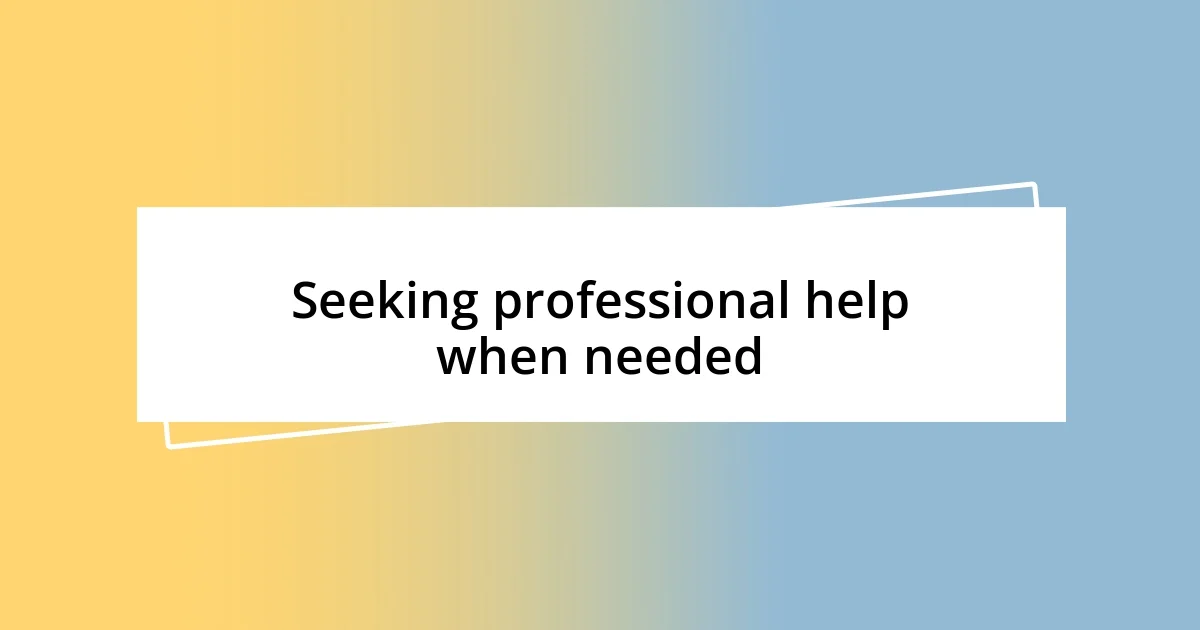
Seeking professional help when needed
Seeking professional help can feel daunting at first, but I’ve learned how vital it can be when performance anxiety grips me. A couple of years ago, after a particularly nerve-wracking experience onstage, I decided to reach out to a therapist who specialized in anxiety. This decision was life-changing. With their guidance, I began to unravel the patterns behind my anxiety and develop strategies tailored just for me. Have you ever felt that a fresh perspective could open new doors for you?
When I walked into that therapist’s office, I was a bundle of nerves, but also hopeful. The experience of talking openly about my fears was liberating. Slowly, I discovered that I wasn’t alone in grappling with performance anxiety. Hearing about others who walked similar paths helped me feel understood and validated. Isn’t it comforting to know that a safe space exists where we can confront our fears and gain valuable tools to tackle them?
I also want to stress that seeking help isn’t a sign of weakness; rather, it’s a robust step toward empowerment. Recently, I enrolled in a group therapy session focused on public speaking anxiety. Sharing the experience with others who genuinely understood my struggle made a world of difference. Together, we practiced techniques and celebrated small victories. It reminded me that growth often flourishes in community. So, why hesitate? Opening up can be the first key to unlocking a more confident version of yourself.












